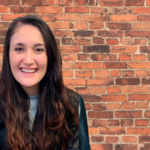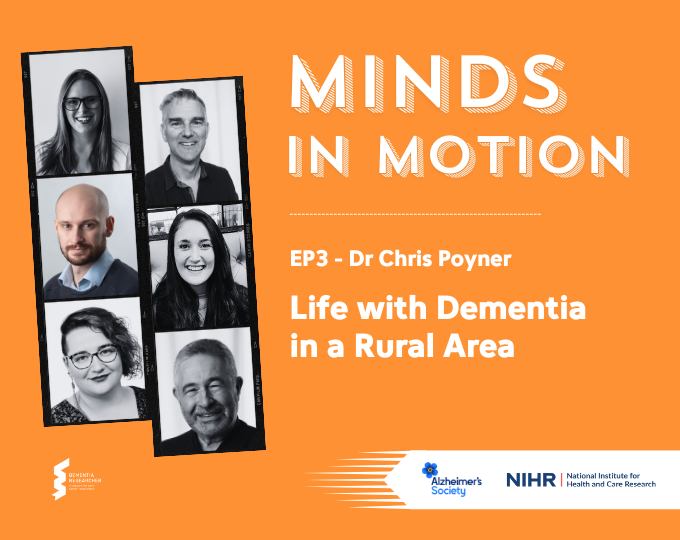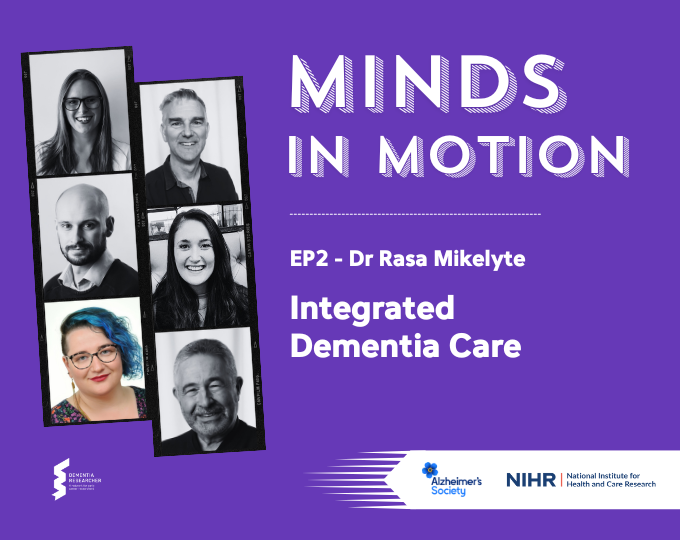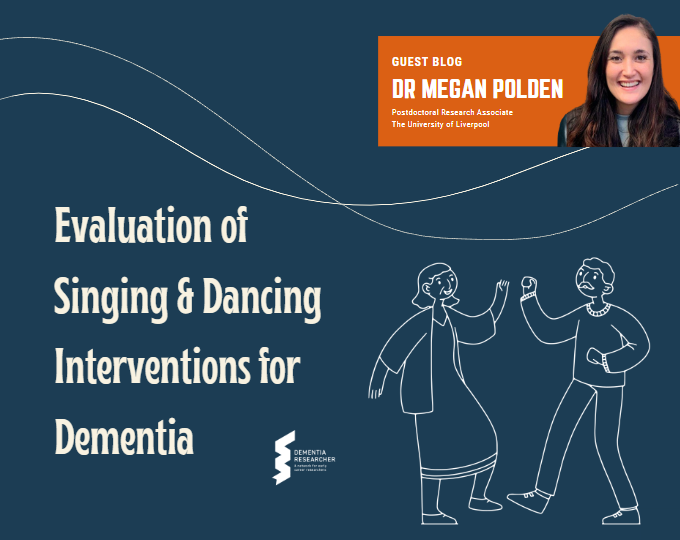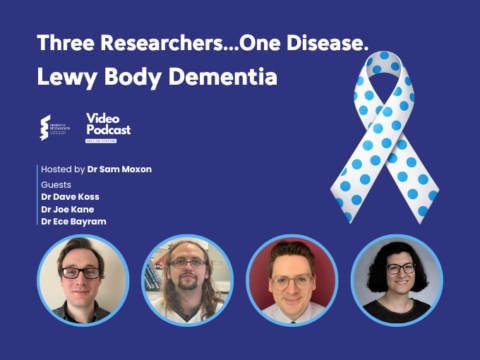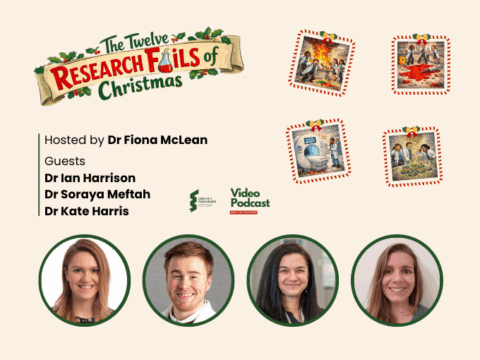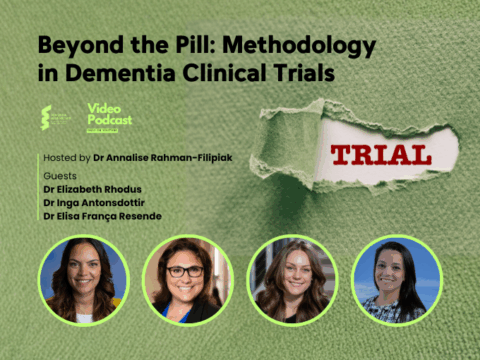The Minds in Motion Podcast from Dementia Researcher in association with the NIHR Applied Research Collaborations and Alzheimer’s Society, brings together NIHR Dem Comm Research Fellows, to talk about their research and careers.
In this first series, five of the Dem Comm Fellows each take a turn as co-host and guest. Alongside the researchers we have the incredible Trevor Salomon, Alzheimer’s Society Volunteer & Vice-Chairperson of the European Dementia Carers Working Group as our permanent co-host and anchor.
In this show Trevor is joined by Dr Chris Poyner from the University of Birmingham and NIHR Applied Research Collaboration (ARC) West Midlands to interview Dr Megan Polden.
Megan works at the University of Liverpool and NIHR ARC North West Coast. She is leading work to understand the benefits of singing and dancing interventions in dementia, and to understand how best these can be delivered in different settings and with people from different backgrounds.
Dem Comm is a 3 year programme funded by the National Institute of Health and Care Research and the Alzheimer's Society. It supports a new generation of dementia research leaders, bringing together researchers from different multidisciplinary backgrounds to encourage cross-cutting and community-orientated dementia research projects that can address key gaps in the evidence around dementia care and support, delivering transformative translational research.
Voice Over:
The Minds in Motion Podcast from Dementia Researcher, in association with the NIHR applied research collaborations and Alzheimer's Society, showcasing exciting new research and the work of the Dem Comm fellows.
Dr Chris Poyner:
Hello and welcome to the fourth episode of the Minds in Motion podcast from Dementia Researcher. Today, discussing the effectiveness and accessibility of singing and dancing intervention services for people living with dementia and the incredible work of Dr Meghan Polden.
Hello, I'm Dr Chris Poyner. I'm a Dementia Communities of Practise research fellow in the West Midlands, NIHR, applied research collaboration working at the University of Birmingham. In the last show, we heard about my research and today it's my turn to sit alongside my amazing co-host Trevor Salomon and take the reins.
Trevor Salomon:
Thanks very much, Chris. Hello, I'm Trevor Salomon. I'm an Alzheimer's Society volunteer and vice chair of the European Dementia Carers Working Group. My passion and involvement are driven through the time I've spent as a full-time carer for my wife, Yvonne, who was diagnosed with young onset Alzheimer's disease. The diagnosis actually came in 2013 when she was 57. I managed to care for her at home until 2019, when her double in incontinence and my fatigue just meant we needed professional care. So, she's been living in a care home for the last five years and very well looked after. Through this podcast series, we've been hearing about some of the incredible research being delivered as part of the Dem Comm fellowship programme. If you are listening for the first time, this is a great three-year partnership between the NIHR, applied research collaborations and Alzheimer's Society, and IT promises to deliver the next generation social science research leaders, and furthermore, is exploring lots of research areas that are often overlooked. So, let's get on with the show.
Dr Chris Poyner:
Hi Megan, could I start by asking you to introduce yourself?
Dr Megan Polden:
Thank you very much for having me. So, my name's Megan and I am a research fellow at the University of Liverpool. I'm also affiliated with Lancaster University as well. So, I am part of the Dem Comm Dementia fellowship cohort, and my current research is looking at singing and dancing interventions and their impact on people living with dementia and their carers.
Trevor Salomon:
And thanks Megan. And can you tell us about your current research?
Dr Megan Polden:
Yes. So, the research project that I'm working on currently, I've got the pleasure of working with two local charities. So, the Brain Charity, which is Liverpool based, and another charity called Lyrics and Lunch, which deliver singing advancing interventions for people living with dementia and their carers. And that they're a mix between whether they're delivered within the community for people living still within the community or whether in care homes and day centres and things like that as well.
So, what we wanted to do is look at the impact of these services for both people living with dementia and carers. So, a lot of previous research has really focused on the impacts that singing interventions and dance interventions can have specifically for people with dementia, which is really important and something we want to capture in our research. But what we also want to capture is the impacts that they can have on people's carers and family and relatives, as well when they attend sessions with them. And then another thing specifically that we want to look at within this research is looking at any barriers and facilitators that people encounter when trying to access these sort of support services as well and kind of ways that they can be potentially adapted to make them accessible and wide-reaching as possible.
Trevor Salomon:
I was extremely interested in one aspect of this. My wife in particular loved singing and she used to go to singing for the memory, and dancing to some extent too. But I wonder if any of your research has covered how you get people to want to attend when generally speaking, they just don't. My father for example, had Alzheimer's. My mother could not get him to go to a day centre or any activities at all.
Dr Megan Polden:
That is going to be quite a tricky thing in terms of being able to try and engage people and get them to want to engage with these type of support services that are on offer. I think it's trying to encourage people to have a bit of an open mind with it. And I know there's been a few people that when I've seen the sessions be done in care homes and day centres, there might be a couple of people that are initially a bit unsure and a bit wanting to take a step back. They might not be in the initial group, and they might just sit back and engage in their own way. But you might find that after a little while, they're kind of up dancing as well or they're really engaging with the singers and things like that and they've actually surprised themselves in terms of what they're wanting to engage with and what enjoyment and things that they can get out of those sessions.
So, I think it's definitely listening to the person in terms of what they're wanting to engage with, but trying to encourage people to have a bit an open mind in terms of what benefit they might be able to get out of these support services.
Dr Chris Poyner:
I was really interested in the fact that you've got loads of different sites for this research. So, there's care homework, community work as well. I was just wondering whether there was any kind of key differences that you've noticed so far in the work that's going on in the care homes compared to the work that's happening out in the community?
Dr Megan Polden:
I definitely think there's different benefits from the sessions that you can get depending on, and that's something that we're going to look at in the research if we're seeing different benefits for people living in the community, whereas people living in care homes and engaging in with day centres. And that's definitely starting to emerge in terms of someone living in the community. Maybe we look at doing measures of loneliness and social isolation and for them being able to grow that social network by engaging in community groups maybe have more of an impact for people living in the community. But for people in care homes, it might be other factors such as maybe improvements in cognition. It might be reduced feelings of agitation and improvements in mood and things like that. So, I definitely think we potentially might see some differences in terms of the different impacts that these groups have at various stages of people's dementia journeys.
Trevor Salomon:
My personal observation of the difference is that when my wife attended sessions in the community, she was very much seen as a participant. In fact, which was the whole purpose of attending. Now she's in a care home. I really feel that when people come along to lead these sessions, they're more of a performer and less recognising the need to have the residents participate. Sometimes they do, but often they don't. And I think that's my obvious difference that I've spotted. I don't know if it's the same for you.
Dr Megan Polden:
So, one of the things that the session leaders and the people who run these sessions are absolutely fantastic at finding ways. The Brain Charity and Lyrics and Lunch as well have developed such fantastic interventions that are just really great at managing to engage people of all kinds of dementia stages. And they use props and different engagement tools like that.
So, for example, some of the sessions we'll use the inflatable ball that they'll pass around and get people to... because kind of engaging, that type of movement and things... get people to throw things, it helps people learn people's names and a bit of an icebreaker. And then they'll also use things like props, scarfs and little instruments and things like that. And sometimes, especially for the dance sessions, it can be quite daunting, they will guide people through movements. But for some people, that's maybe a bit too difficult for them to engage with.
But a lot of the time, if you give them a scarf or you give people an instrument, the first instinct is to kind of move them around or shake them or do something with it because they're given that. Using those different methods to be able to engage people. And then also, just the session leaders are just fantastic in terms of if somebody maybe is engaging in their own way in terms of maybe not following all the dance moves or maybe not actively singing along, but they're just kind of sitting back and listening. It's kind of all about having eye contact with them and going over to approach them and getting engagement in different ways.
Dr Chris Poyner:
Yeah, that's really interesting, Megan. I was really wondering about, because it seems to me there's two kinds of things going on here. You've got the benefits, potential benefits to the music itself and engaging with music and then the peer support and interaction and attendance at these sessions. And I was just wondering whether you're separating out those two variables or whether you are just judging it more holistically.
Dr Megan Polden:
Currently, at the minute, we're not able to do a randomised control trial. We're able to completely separate the social elements of them. It's something we'd like to be able to tease apart the differences and the benefits of specifically doing a singing or dancing intervention and then trying to discern from all the social aspects and things that come along with it.
But specifically, for these two charities and the intervention that they've developed, for them, the social aspect is a really key integral element of it. So, for example, with the Brain Charity, they do a bit socialising with the sessions to before they begin, and then they'll do their singing or dancing intervention. And then they'll also hang around and interact with the residents and people who attend the sessions for a little bit afterwards as well to kind of build up that type of rapport. And then with Lyrics and Lunch, the format of their sessions is that they have an hour singing and then an hour sociable lunch. So that social element particularly for these interventions is a really integral part. It's something we'd like to do in the future in terms of being able to tease apart the benefits of where they're coming from, from the two different locations. But specifically in our research at the minute, it's not something we're able to do unfortunately.
Dr Chris Poyner:
Yeah, no worries. Then the other thing I was wondering about was the kind of therapeutic benefit of the sessions for the relationships and care homes between the staff and the residents, and also any potential for these sessions, especially the ones that are engaging the people with dementia and getting them to use instruments in certain ways, even if it's quite rudimentary, to challenge some of the notions around people with dementia, the stigma and their ability to learn new things, for example.
Dr Megan Polden:
Yeah, that's a really good point. So, I'll answer the first, about the relationships with care staff and living with dementia. So that's a really, really nice thing that we've seen, and I've been able to witness from the project and that we're trying to capture as well in terms of qualitative interviews with them, the care staff and care facilitators. And it's come up quite a lot of the time that it has kind of impacted how they deliver their care, having experienced the intervention, and that they've had those kind of bonding moments with residents and people living with dementia. And they found it really beneficial, and it's impacted their day-to-day kind of how they give care and they've fed back that they kind use the same songs and they'll be singing the songs to people and they'll be able to respond to that and things like that.
And then they've also just kind of fed back in terms of they've just had a lot more music just generally in the care home and around the care home and they've been utilising that a lot more because they've really seen the benefit that it's had to people. And then it's been really lovely to see as well how it's... especially with the dancing sessions and the singing sessions, there's been a lot of times where the care staff might not realise that they've come from a dance background. And you put some music on, and they'll just get off and they'll be dancing with the care staff and maybe other residents and the session leaders. And you can see their reactions that they just did not know that... you could clearly see that they've maybe had a dance background from how they're moving. It's just lovely to see them kind of witness that, learn something new about that person.
Trevor Salomon:
When I took my wife to singing for the memory sessions because she had to be accompanied by somebody, that was the rule, she was always incredibly happy and in a great mood immediately afterwards. And the same applied to the dance session she went to at a day centre, which I didn't attend. But half an hour later, she had no recollection of either. And I often wondered, what is the science behind all of this and why do cognitive functions and emotional wellbeing seem so improved immediately after a session?
Dr Megan Polden:
That's a really good question. So, I think there's a lot of science behind it, in terms of how music can be cognitive stimulating for people. When you're singing, it engages different parts of the brain from just plain speech and things like that. And that can have a lot of cognitive benefits for everybody. And then in terms of the different kind of benefits that you can have, but maybe with mood that might appear short-lived, I think that's one of the things we're wanting to try and discern is how those impacts are from the sessions. And that can be really difficult to determine and capture in research. But I think they can potentially be long-lasting in terms of they might not have an improvement on your mood straight away. But you can kind of [inaudible 00:13:20] that reflects in maybe how agitated people are throughout the day and things like that. I do think the benefits can be more wide-reaching, especially when you look at the social connections and things like that that develop from going to these sessions as well.
Trevor Salomon:
I'm a lousy dancer, so I couldn't help with anything thereafter, with those sessions. But for the singing, for memory sessions, then I would help my wife sing those songs for as long as I could remember them after the session. And she did join in, and she did smile, and that definitely worked. But if I didn't do that, it was just all gone in a flash, unfortunately.
Dr Megan Polden:
Yeah, yeah. So, I guess as well, that's a really good point to make as well in terms of maybe encouraging friends and relatives and carers at home to keep doing those songs for longer to be able to make them last longer. I think that's a good point.
Dr Chris Poyner:
Thanks guys. So, Megan, I was wondering about the usefulness or the effectiveness of these interventions for people living with quite advanced or end of life dementia or receiving end of life care. And obviously, we're talking about care homes. Again, that's an area that I'm particularly interested in. So, I was just wondering whether in the care homes, the staff there are able to have the facilities or the desire to help residents get into these sessions who may be really struggling with their health.
Dr Megan Polden:
That's a really good point, and I think there's a lot of research that's been done, that's looked at different types of music interventions and which ones are maybe most appropriate at different stages of people's dementia journey. And a lot of the research has indicated that more music listening at more advanced dementia stages can be more beneficial and have more benefits in that way. With the singing and things that they might get to the point where they struggle to actively engage with that type of dimension. I do you think there is specific stages where it may be different types of music intervention, so more passive music listening might be more beneficial.
Trevor Salomon:
In my wife's care home, and this is really a response to Chris, but Megan's view would be interesting too, they publish every week a list of activities, and when the family members receive those lists, they will often call into the care home and say, "Please make sure that my loved one attends this because I know they will enjoy it." So sometimes I think a push, a gentle push, needs to come from family members too.
Dr Chris Poyner:
So, you've touched on this a bit already, Megan, but I just wanted to give you the opportunity to highlight what your research is building upon in terms of what the evidence base that already exists. Is there anything specifically that's inspired the project or what you'd like to build upon?
Dr Megan Polden:
As I was mentioning previously, in terms of being able to catch up the impact that these interventions have on carers, family members and people living with dementia is a really important factor for this specific research. And then a lot of previous research has specifically focused on the singing intervention itself and kind of more of the cognitive benefits of the singing. There's been a large amount of research that's focused on how does this impact people's cognition. And that's really important to be able to capture... a lot less of the research is focused on the social element, and that's specifically something that we really wanted to expand the research on with looking at these interventions.
Trevor Salomon:
How do you measure the effectiveness of interventions then, Megan?
Dr Megan Polden:
That in itself is difficult to do. We are using a mixed methods model for our interventions. So, each service kind of runs slightly different. So, the Brain Charity intervention, they offer theirs as a 12-week intervention. And they'll get, people will experience a session every week, for that particular method we're doing assessments prior to when they started an assessment after on a range of different standardised questionnaire measures.
And then for Lyrics and Lunch, because there's people are already actively attending it, they tend to have a bit of a break during the summer. So, we're kind of doing a bit of a seeing how people are on these standardised assessments in terms of mood, wellbeing, quality of life. And then we're comparing that to when they have been attending it as best as when they've not been attending it. And then we're also looking at it from a qualitative aspect as well, getting people's opinions on the impact that it has on their lives, from people with dementia and their carers, and then also the session leaders and care staff and session facilitators that help facilitate these. So, trying to see it from as many different angles to be able to capture the impact that it has by using a range of methods really.
Trevor Salomon:
And to what extent are you under more pressure than ever to measure? I'm thinking in the context of funding now, because funding is ever more challenging and in order to get money out you need to be able to prove something, I guess. So, is this something that you're helping, for example, care homes or groups to deal with?
Dr Megan Polden:
So, in terms of helping them to get funding, is that what you meant?
Trevor Salomon:
Specifically, in that context.
Dr Megan Polden:
Yeah, so that is one of the reasons why we wanted to work with some of the charities that have already established these types of interventions because they are kind of standalone charities and they do need their own funding to be able to continue to run these sessions and to be able to grow sessions so they can help more people. That is something that we're hoping that our research, if it does show an impact on their services, will be able to help them improving their impact when they go for more funding applications to be able to support and to maintain the kind of interventions and stuff that they've established within the communities.
Dr Chris Poyner:
So Megan, just to focus on the community work for a minute, because we've talked a lot about the care home stuff, I was just wondering about the settings that the interventions take place in and about any challenges that you've had with those settings or whether you feel there's any barriers in place that may be preventing people from attending in the environment, for example?
Dr Megan Polden:
Yeah, that's a really good point. So, the community-based sessions that are predominantly based in Lancaster area, so it is more of a rural area. So, when we have been looking at barriers and things like that, that travel and access to those venues have come up as a barrier for people attending them. And I think that's one of the reasons why the charity, in particular Lyrics and Lunch, is trying to get as many possible groups that they can get established as much as they can. So, to be able to make it as easy as possible for these people to attend those sessions. So, Lyrics and Lunch, it's a church-based charity as well. So, they'll tend to use community halls and church halls there. So, a lot of the times they are quite nicely situated within communities. So, it's just trying to be able for them to get more groups and more [inaudible 00:20:14] and things like that so that they can deliver more, they can be more easily accessible for people.
Dr Chris Poyner:
Yeah. I think it's probably quite a key thing. I know from some of my research previously, I know this isn't about me, but I did some work on this in Salford Uni and we had a place on site where the music interventions would take place and then one time they said we can do it in there, we had to move it to a different room and it was really detrimental to the people with dementia. So, I was just wondering if you have any reflections on, I guess the importance of space for these things to be successful?
Dr Megan Polden:
Yeah, definitely. I think having a nice open space where people can get familiar with it and having that space being maintained throughout the whole of the intervention or for as long as possible, I think is really important because like you say, people getting familiar with this space and getting comfortable in that place is really important for them to be able to engage with those type of sessions and feel comfortable in that environment as well. So yeah, I do think that's a really important point.
Trevor Salomon:
And I think familiarity becomes another aspect. I first started taking my wife to a singing for the brain session, which was 40-minute journey away. And eventually, I found a group that was 10 minutes away. So, it was much more convenient for me, but it took my wife a while to settle into that group because she wasn't familiar with the environment.
Dr Megan Polden:
Yeah.
Dr Chris Poyner:
Then just finally on barriers, I wanted to ask about I guess the cultural nature of these sessions. How would you describe the cultural nature of these sessions, and do you think that whatever that is may cause some issues in terms of engagement with people from more diverse communities and backgrounds?
Dr Megan Polden:
Yeah, that's a really good point. So, the sessions do try and incorporate a bit of an individualised element for people. So, in terms of they will have set songs that they'll tend to do and they're quite popular songs that people will tend to know. And then they will also take requests from people being able to tailor it to their specific music tastes and things like that. But yeah, I would agree, the sessions as they are, are currently predominantly tailored towards people from a white British background. And I definitely think having services like this that are adapted to different cultural backgrounds is really, really important because I think even maybe just adding a few songs is not quite enough to capture the range of different types of music that people experience, and people know from their youth. And so, I do think having adapted versions of these for people from different cultures is really important to be able to get more people to engage with them.
Trevor Salomon:
And I guess in a multicultural society where we've had immigration flows over the years, that becomes an imperative because the songs that people remember that are deep in their memory will be from their childhood in another country, potentially.
Dr Megan Polden:
Yeah, yeah. Absolutely, yeah.
Trevor Salomon:
In terms of your work, Megan, have you got any really outstanding case studies that you could share with our listeners and viewers?
Dr Megan Polden:
Yeah. So, it's been, I think for me in particular, it's been absolutely an absolute pleasure to be able to go to all these sessions and attend them and see the impact they have on people. We've had one particular couple who can even engage with the sessions, and they were doing one of the dance sessions. And they only just recently entered an assisted living facility. And it was lovely to see how the impact it had on their relationship and seeing them being able to do something that they enjoyed together.
And that was also one of the first community groups that they'd started to engage with. They'd also had some problems with trying to convince the person with dementia to want to go to and engage with day centres. And after that 12 week intervention, that was something that they were talking about and talking about how much they were going to miss this particular dance session, but how they were then had the confidence to be able to seek out those other interventions and art groups and different things that were going on in the community and potentially looking at trying a day centre as well. So, seeing the impact in that sense and hearing their experience and how it's given them that confidence to be able to try these new activities and engage with those things, that was really nice to see.
Trevor Salomon:
The question we'd love to ask you is where do you see your research heading? What's the next phase of your research?
Dr Megan Polden:
Yeah, that's a good question. So, I know we've talked about some of the difficulties that we can have in terms of being able to capture the impact of these sessions. And one of the things that I'd like to do going forward is in the moment analysis and video analysis of comparing people's behaviour for maybe an hour before the activity and then how much engagement they have during the activity as well and maybe captures those shorter term benefits that we've not been able to necessarily capture in our current research. So, I would like to look at incorporating those methods a little bit more. And then the point that Chris is making as well in terms of being able to make some of these sessions a bit more culturally, adapted culturally to different types of people to be able to make them more wide-reaching, that's definitely something that I'd like to look into doing in the future as well.
Trevor Salomon:
Right. Well, in the next part of the podcast, we've got some quick-fire career questions for you, that we hope will help others thinking about working in the field. And we'd like you to share some of what you've learned from across your career and through the Dem Comm programme.
Dr Chris Poyner:
So, Megan, are you ready? Remember, short answers only. Okay. The first question is, was there a pivotal moment or influence that led you to specifically choose dementia research as your field of study?
Dr Megan Polden:
So, when I was doing my A-level during the summer holidays, I did some voluntary work in a care home and that was kind of one of the first proper experiences I've had with working with people with dementia. And that really just made me fascinated by the condition and just seeing the impact it had on people with dementia and their carers as well. And just since then I really wondered with those people and ever since then I was just wanted to do research to help them.
Trevor Salomon:
Thanks. And if you think about others who might follow you, what skills do you consider essential for anybody aspiring to a career in dementia research?
Dr Megan Polden:
I think having really good communication skills and being a good listener as well. I think all research projects should be fed from people living with dementia and their carers and relatives and things like that. And I think it's integral to be able to listen to what people are needing to be able, as a first point of call before you even think of how to develop research and having that engagement with people within the community of what they need. And so, I think having really good listening skills and good communication skills to reach out.
Dr Chris Poyner:
Fantastic. Megan, how do you maintain a healthy life balance in the context of the challenges of academia?
Dr Megan Polden:
Yeah, I do try. I think that I'd be lying if I said that I got [inaudible 00:27:20] every time. I feel actually having a dog helps because she has amazingly strict schedule. And come six o'clock, whether my laptop's closed or not, she is hassling me to take her out for a walk. So, it helps me switch off a little bit in that sense. But I think it is really challenging. I think when you love what you're doing so much it doesn't seem quite [inaudible 00:27:48].
Trevor Salomon:
Most people have, dogs seem to tell me that that definitely imposes an exercise discipline, which otherwise they may not have. Yeah, unfortunately I've only got fish in a fishpond, and they don't give me any of that at all. What's the most important thing you think you've learned so far from the fellowship programme, Megan?
Dr Megan Polden:
Yeah, that's a good question. One of the things that I've learned that's been really great, how different and how diverse the cohort is in terms of how they've managed to get into the fellowship and where they're at, how they've gone to get to that place. So, I think previously when I was studying, I always thought that it was only really one way to get into research. And I think doing this fellowship and meeting all these different people from all these different backgrounds has really showed how there's so many different ways that you can get into research and that you can get into research at any different point in your career as well. So, I think that's been really interesting to see.
Dr Chris Poyner:
And what advice would you give to anyone just finishing their PhD and undecided on what to do next?
Dr Megan Polden:
That's a good question. I would say persevere. I think perseverance. I think I've got in research and academia as well; there's a lot of rejection and you can feel like you're having a lot of setbacks, and it can be quite challenging to be able to get to where you're hoping to get to. And I think just persevere with it. And if it's a research area that you really, really love, just keep persevering with it. And even if it's not the right time for that particular project and that application maybe doesn't get accepted at that particular time, keep it. It's still potentially a really good idea and maybe the time is just not right. So, I think it's just that perseverance to keep trying to do what it is that you are interested in.
Trevor Salomon:
I'm sure that's very sound advice. Right, we're coming up to the final questions and these are a little bit different. If you could time travel to any period in history, when would you go to share your knowledge about dementia and why?
Dr Megan Polden:
That's a really good question. I think to be able to go back as far as possible where people would be willing to accept the research and actually want to engage with it. Yeah, I think it's a tricky one in terms of gauging exactly when that would be. But I guess I'm giving a bit of a cop out answer here. Yeah, I think particularly for the singing and dancing maybe around the '60s, because I definitely think at that time singing and dancing was definitely more integral to people and the kind of engaged them a bit more. So, I think trying to keep that going, maybe to be able to explain the benefits at that stage and also kind of explain to people what dementia is earlier just at any point would be beneficial.
Trevor Salomon:
I don't know what Chris thinks about that response, but I think I'd also want to go back to the '60s. I remember as a kid being frightened when I heard parents and others saying, "Oh, granny's gone Doolally" or senile because nobody really understood what was happening to them. If we could have understood differently that it was a disease and it wasn't their fault rather than something that would just happen to older people, I think I would've been less scared about going into care homes. But I was as a child, really quite scared of care homes, as many children were.
Dr Chris Poyner:
Yeah.
Dr Megan Polden:
Yeah. I think that's a really good point. Sorry, I'm going off a little bit, on a tangent. But I think that one of the areas that I really find interesting is kind of intergenerational research and I think being able to educate children on what dementia is and removing that stigma is also really important.
Dr Chris Poyner:
So next question, if you could collaborate on your dementia research with any fictional character, who would it be and how would you think they would contribute?
Dr Megan Polden:
Found this one really tricky. I wasn't sure the best avenue to go on this one. But I was thinking someone like Iron Man, because... well, as we saw when I was trying to set my mic up for this, I'm not worried. I'm not that tech-savvy. So, if I could have someone that could be really tech-savvy, I feel like that would complement my lack of skills in the technology department. And he also might have some spare funding lying around as well.
Dr Chris Poyner:
That's critical. Absolutely.
Trevor Salomon:
That wasn't an answer I was expecting.
Dr Megan Polden:
[inaudible 00:32:11].
Trevor Salomon:
Well, thank you for that. I'm afraid that's all we have time for today. If you want to learn more about this topic or the Dem Comm programme, visit the Dementia Research website where you will find a full transcript, Megan's biography and very much more. Now I would like to thank our incredible guest, Dr Megan Polden. I'm Trevor Salomon.
Dr Chris Poyner:
And I'm Chris Poyner. And you've been listening to the Dementia Researcher Podcast.
Voice Over:
You've been listening to the Minds in Motion podcast from Dementia Researcher, in association with the NIHR, applied research collaborations and Alzheimer's Society. To learn more about the Dem Comm programme and to get all the support you need, visit dementiaresearcher.nihr.ac.uk. And don't forget to like and subscribe.
Like what you hear? Please review, like, and share our podcast - and don't forget to subscribe to ensure you never miss an episode.
If you would like to share your own experiences or discuss your research in a blog or on a podcast, drop us a line to dementiaresearcher@ucl.ac.uk
Did you know... you can find our podcast in your favourite podcast app on mobile devices, and our narrated blogs are also available as a podcast.
This podcast is brought to you in association with the Alzheimer's Association, Alzheimer's Research UK, Race Against Dementia and Alzheimer's Society, who we thank for their ongoing support.
The views and opinions expressed by the host and guests in this podcast represent those of the guests and do not necessarily reflect those of UCL or Dementia Researcher

 Print This Post
Print This Post
